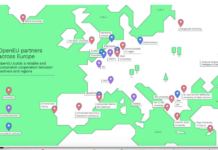
Here I am in Toronto, on my way to Costa Rica (no direct flight from Vancouver, which means a stop-over in Toronto) for the ICDE World Conference on Distance Education, hosted by UNED Costa Rica.
Overall, the conference lasts for just three days, so I will actually spend more time travelling to get there and back than at the conference itself.
Pre-conference organization
The conference has a phone app which sort of works, so far. This has enabled me to plan a schedule for the conference, deciding on which sessions I want to go to. I really appreciate the chance of doing that before I get there. The app is a bit light on directions to the conference and check-in but I guess I’ll work that out when I get there.
Comparing the list of attendees to the listed speakers, I’m guessing that quite a few are presenting virtually, but I could be wrong. I fully understand why, but it’s a bit disappointing for those who are making the effort to attend in person, as the opportunity to chat informally with speakers is then lost. I’m thinking a conference should be entirely virtual (for environmental reasons), or fully in-person (once every four years), for networking reasons.
The informal networking at this specific conference is really important for me, as it will be my last conference as I’m now retired and I am hoping to meet former colleagues and friends from around the world. The app allows me to reach out to specific participants to make a connection which is invaluable in large conference.
The participants
Note: the attendee numbers below are not official and are taken from the app. Sometimes attendees represent regional or global organizations rather than institutions in a single country, so the sorting isn’t perfect
There are over 500 attendees listed. Not surprisingly, roughly half are from UNED (Universidad Estatal a Distancia, Costa Rica), which is hosting the conference, and from CONARE, the Association of Costa Rican Rectors, and other institutions in Costa Rica. This is a once-in-a-lifetime opportunity for instructors and administrators at UNED and other institutions in Costa Rica to meet others from all around the world working in distance education.
There is also good representation from Canada, with 35 participants. There are 28 from the USA, 26 from Mexico. Nigeria has 15, South Africa has 14, Spain has 12, and China has 11. In addition to the 250 or so from Costa Rica, there are in regional terms:
- 89 from North America (including Mexico),
- 61 from Central and South America,
- 47 from Europe,
- 42 from Africa,
- 28 from Asia and
- 5 from Australia, New Zealand and the South Pacific.
I am somewhat surprised by these numbers. There are only six from the UK, and only one from India (which has many open universities), and the attendance from Australia and New Zealand is astonishingly low, given their past contributions to distance education.
Costa Rica is a long way away for these countries, but in the past these countries have had very strong institutions focused specifically on distance education, and have in the past been strongly represented at ICDE conferences, even in far flung places. At the same time it is encouraging to see so many participants from Africa. Canada has so many because, well, we do distance – Vancouver is further from Toronto than Toronto is from San Jose!
In a later post, I will return to the issue of who is attending this conference. It probably reflects mainly the influence of the pandemic, global warming and the rise of virtual presentations – there is less desire or justification these days to travel long distances for a face-to-face conference – but I do think the attendance also reflects a critical turning point or ‘pivot’ for distance education which will turn out to be as significant as the change from correspondence to distance education. Nevertheless, getting over 500 participants is still an achievement these days, so well done UNED and ICDE.
Tomorrow I will cover the program set out for the next three days, which also raises some interesting questions about the status and development of distance education. Then we will get to the conference itself.
Questions
In the meantime, a couple of questions for you:
- can global in-person international conferences on education be justified these days?
- did you consider attending this conference but decided not to? If not, why? Too far? Too expensive? No longer relevant? No institutional support?
Please use the comment box at the end of this blog post or email me at tony.bates@ubc.ca.









 Dr. Tony Bates is the author of eleven books in the field of online learning and distance education. He has provided consulting services specializing in training in the planning and management of online learning and distance education, working with over 40 organizations in 25 countries. Tony is a Research Associate with Contact North | Contact Nord, Ontario’s Distance Education & Training Network.
Dr. Tony Bates is the author of eleven books in the field of online learning and distance education. He has provided consulting services specializing in training in the planning and management of online learning and distance education, working with over 40 organizations in 25 countries. Tony is a Research Associate with Contact North | Contact Nord, Ontario’s Distance Education & Training Network.


No, in-person international conferences cannot be justified because of the ready availability of suitable alternatives which are far less expensive and damage the environment far less:
European Federation for Transport and Environment (2023) What is aviation’s contribution to climate change?
https://www.transportenvironment.org/challenges/planes/airplane-pollution/
As a fully online distance educator, I spend much time at my computer. I enjoyed attending a global in-person conference after a long hiatus. I had the opportunity to meet, talk and network with people from Canada and other countries. I met several of my students for the first time in a physical space. I recently attended Athabasca University’s in-person graduate student conference for the first time in several years. The students and staff members I spoke with were thrilled to be there, away from their computers and daily routines. However, virtual conferences are more convenient, less expensive, more accessible and easier on the environment. Perhaps we can capture the best of both.
Thanks, Pamela – I wouldn’t have met you if it hadn’t been in person so there’s at least one benefit!